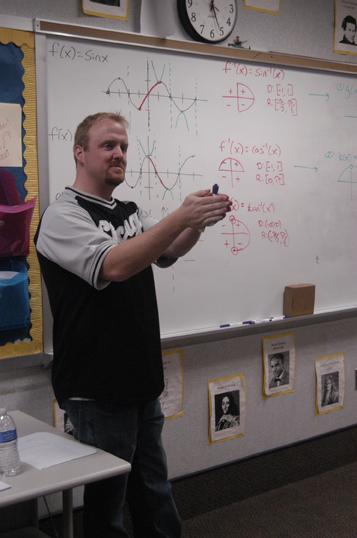Along with the Gradual Release of Responsibility model (GRR), this school’s administration plans to adopt the Research-based Inclusive System of Evaluation (RISE), another model that includes student achievement and engagement in its judging criteria, this fall.
According to Principal John Williams, the merit pay system will go through some tweaks and fixes before its implementation next school year
“I think it’s like anything else,” Williams said. “It makes people nervous. It makes me nervous. It’s a huge responsibility to fairly evaluate a lot of folks. I think just the scope of it. So many different things. Just a lot of planning and looking at it. There will be some training for all of us.”
The RISE merit pay system will have teachers, administrators and counselors evaluated for the areas of planning, instruction, teacher leadership and professionalism. According to Williams, all teachers, administrators and counselors will be evaluated and categorized as: highly effective, effective, not effective and needs improvement. Staff members who are in the lower two won’t receive any raises, and at some point, the fate of their jobs could be affected.
“Of course, our goal is for all our teachers to be in the top two (effective or highly effective) and set up a system that will give teachers the opportunity to meet that criteria,” Williams said. “Our teachers are already effective and highly effective, so it’s just that structure that is in place where there is evidence of it, documentation of it. As we go into next year, we can evaluate that. Again, not just teachers, but administrators and counselors also.”
There are, however, some concerns regarding the new system which is this connection of pay with performance. Math teacher Dan Perdun said although he supports merit pay system, he is concerned about some of the aspects of the new system.

“I believe for any job you should be held accountable for what they’re teaching, how they’re teaching and how effective they are as teachers,” Perdun said. “The concern is: how do you fairly rate a teacher when they aren’t the only ones responsible for the learning? What if you have students who don’t pay attention, don’t do their homework and don’t show up? Should a teacher be judged on that when a student doesn’t learn anything? That’s where I have difficulties with merit pay because how will I be assessed on those factors that the students bring in?”
On the other hand, Senior Class president Hannah Larson said she supports a standardized way to judge performance, which means that pay performance of teachers should be based on standardized test scores rather than high grades.
“If one class is easier than the other, it’s comparing apples to oranges for the students,” she said.
For Larson, she said she is worried some teachers may make their classes easier or make the curriculum, through the medium of tests and quizzes, less difficult for the students when the merit pay system is established.
“If a teacher is really passionate about teaching and kids learning, it’s not about test scores. They shouldn’t do it based on their money. They should also teach; it’s their job,” Larson said. “Maybe this program won’t make better teachers, just easier classes.”
Perdun said that although the new merit pay system may have a selection of cons, one aspect that he said he agrees with is the removal of unfairness surrounding the salary of teachers.
“Do I think it’s fair that any teacher could walk into a classroom and get paid the same? Well, I don’t know. That doesn’t happen in business. Why should it happen in education?” Perdun said. “When you say my pay is affected by how well I teach, I can tell you right now that I will probably work a little harder.”
Perdun, however, said there are several concerns and issues to the system.
“I didn’t really go into teaching for the money. So what will be taken out of the classroom when you put my pay to how well my students are learning? When I’m in class right now and random topics come up that are related to what I’m teaching that are fun and interesting, I like to go into those,” Perdun said. “I’m fearful we are going to get teachers that are not going to endorse this freedom of learning. There’s that unwritten curriculum that teachers bring into a classroom, their shared experiences. I’m afraid we are going to become like robots. I’m scared you are going to lose some of the freedom of teaching.”~




























![Keep the New Gloves: Fighter Safety Is Non-Negotiable [opinion]](https://hilite.org/wp-content/uploads/2024/12/ufcglovescolumncover-1200x471.png)















































![Review: “We Live in Time” leaves you wanting more [MUSE]](https://hilite.org/wp-content/uploads/2024/12/IMG_6358.jpg)
![Review: The premise of "Culinary Class Wars" is refreshingly unique and deserving of more attention [MUSE]](https://hilite.org/wp-content/uploads/2024/12/MUSE-class-wars-cover-2.png)
![Introducing: "The Muses Who Stole Christmas," a collection of reviews for you to follow through winter [MUSE]](https://hilite.org/wp-content/uploads/2024/12/winter-muse-4.gif)
![Review: "Meet Me Next Christmas" is a cheesy and predictable watch, but it was worth every minute [MUSE]](https://hilite.org/wp-content/uploads/2024/11/AAAAQVfRG2gwEuLhXTGm3856HuX2MTNs31Ok7fGgIVCoZbyeugVs1F4DZs-DgP0XadTDrnXHlbQo4DerjRXand9H1JKPM06cENmLl2RsINud2DMqIHzpXFS2n4zOkL3dr5m5i0nIVb3Cu3ataT_W2zGeDAJNd_E-1200x884.jpg)
![Review: "Gilmore Girls", the perfect fall show [MUSE]](https://hilite.org/wp-content/uploads/2024/11/gilmore-girls.png)
![Review in Print: Maripaz Villar brings a delightfully unique style to the world of WEBTOON [MUSE]](https://hilite.org/wp-content/uploads/2023/12/maripazcover-1200x960.jpg)
![Review: “The Sword of Kaigen” is a masterpiece [MUSE]](https://hilite.org/wp-content/uploads/2023/11/Screenshot-2023-11-26-201051.png)
![Review: Gateron Oil Kings, great linear switches, okay price [MUSE]](https://hilite.org/wp-content/uploads/2023/11/Screenshot-2023-11-26-200553.png)
![Review: “A Haunting in Venice” is a significant improvement from other Agatha Christie adaptations [MUSE]](https://hilite.org/wp-content/uploads/2023/11/e7ee2938a6d422669771bce6d8088521.jpg)
![Review: A Thanksgiving story from elementary school, still just as interesting [MUSE]](https://hilite.org/wp-content/uploads/2023/11/Screenshot-2023-11-26-195514-987x1200.png)
![Review: "When I Fly Towards You", cute, uplifting youth drama [MUSE]](https://hilite.org/wp-content/uploads/2023/09/When-I-Fly-Towards-You-Chinese-drama.png)
![Postcards from Muse: Hawaii Travel Diary [MUSE]](https://hilite.org/wp-content/uploads/2023/09/My-project-1-1200x1200.jpg)
![Review: "Ladybug & Cat Noir: The Movie," departure from original show [MUSE]](https://hilite.org/wp-content/uploads/2023/09/Ladybug__Cat_Noir_-_The_Movie_poster.jpg)
![Review in Print: "Hidden Love" is the cute, uplifting drama everyone needs [MUSE]](https://hilite.org/wp-content/uploads/2023/09/hiddenlovecover-e1693597208225-1030x1200.png)
![Review in Print: "Heartstopper" is the heartwarming queer romance we all need [MUSE]](https://hilite.org/wp-content/uploads/2023/08/museheartstoppercover-1200x654.png)




